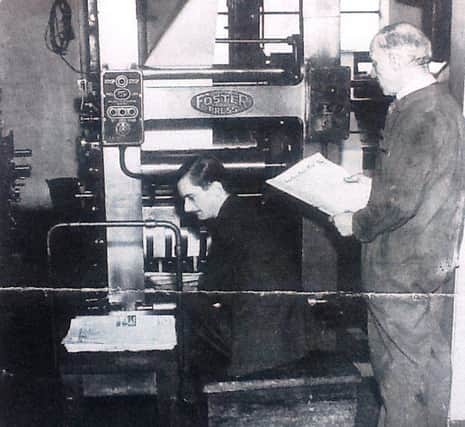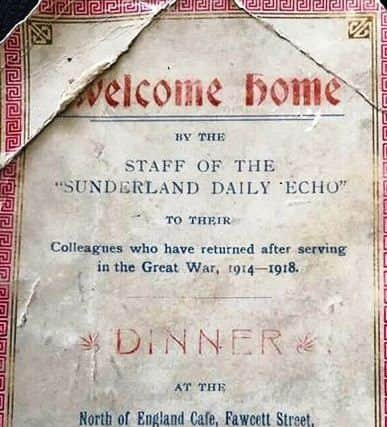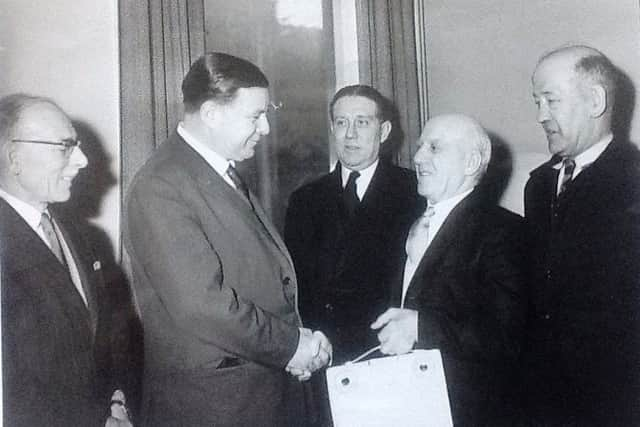Sunderland soldier carried his mortally injured officer on his back


Sunderland man Percival Jubilee Spendley may well have been one of the first people ever to see tanks in action.
The Durham Light Infantryman fought fierce battles in German trenches.


Advertisement
Hide AdAdvertisement
Hide AdHe may well have been the man who single-handedly led a mortally-wounded officer from the field of battle by carrying him on his back.
And he was part of a battalion which spent two days consolidating the Allied lines in the face of a massive German barrage.
We are indebted to David Riseley for sharing an incredible reminder of this hero of the First World War.
It concerns his wife’s grandfather who was known to all as Percy.


Advertisement
Hide AdAdvertisement
Hide AdPercy served as a private in the 20th Battalion of the Durham Light Infantry which was known as the Wearsiders.
He saw action in France, Belgium and Italy and survived the ordeal. He paid a heavy price, however, as he was gassed and only had one functioning lung on his return.
But Percy had more luck than the millions who paid with their lives on the battlefield.
Thanks to David, we have a vast record of Percy’s life at war.
Advertisement
Hide AdAdvertisement
Hide Ad“He fought in the Somme, Flanders, and Ypres as well as a spell in Italy,” said David.
In a dramatic twist, Percy was involved in a battle which would change the course of warfare. He was part of the Battalion which saw action at Flers/Courcelette from September 15, 1916.
It was famous for being the first time that tanks had been used in action.
A year later, Percy’s battalion was at Messines where the battle started with a huge explosion of 20 mines under German lines. It was so powerful, the impact was felt in London.
Advertisement
Hide AdAdvertisement
Hide AdThere was no let-up in the Battalion’s front line action and just a month later, the Wearsiders were engaged in fierce fighting at Pilekem Ridge, among the system of concrete pillboxes within the German positions.
By the time it was over, eight officers and 431 other ranks were dead.
There was more horror to come. In October 1916, the Battalion was involved in heavy action in the Ancre valley. The rain turned the battlefield into a mire of mud and it became known as one of the worst battlefields of the war.
There were other desperate times as well but perhaps the most dramatic was when Percy was a batman and carried his mortally injured officer off the battlefield.
Advertisement
Hide AdAdvertisement
Hide AdSadly, the Commanding Officer died from his injuries. But the question is, would Percy have been mentioned in dispatches for his bravery if the officer had survived?
When it was all over, Percy’s health had been badly affected by war.
David said: “He was found in a hospital at the end of the war having suffered from gas which left him with only one functioning lung.”
It is not clear where he was found but what is certain is Percy’s peacetime record.
Advertisement
Hide AdAdvertisement
Hide AdHe was born on March 2, 1897, one of 12 children. He lived in High Street West and later High Street, Sunderland before joining the DLI.
He worked before and after the war within the newspaper industry and joined the Sunderland Echo in 1913.
After surviving so much horror in the war, he returned to awarm welcome – and dinner.
It was held on June 4, 1919 at the North of England Cafe in Fawcett Street, Sunderland. The invitation said: “Welcome home by the staff of the Sunderland Daily Echo to their colleagues who have returned after serving in the Great War.”
Advertisement
Hide AdAdvertisement
Hide AdOn the menu was boiled halibut, shrimp sauce, roast pork and apple sauce, roast lamb and mint sauce, sirloin of beef, and roast chicken and ham. There were desserts of apple tart, rhubarb tart, almond pudding, vanilla sauce, blancmange, fruit jellies and compote de fruits.
It was the least Percy deserved and as the world returned to peacetime, he returned newspapers and joined the Northern Daily Mail in Hartlepool in 1919.
Percy was head machinist at the Echo’s sister paper when he retired on health grounds in 1960.
He sadly passed away in May 1964. He was 67 years old and left a widow, a son and two daughters.